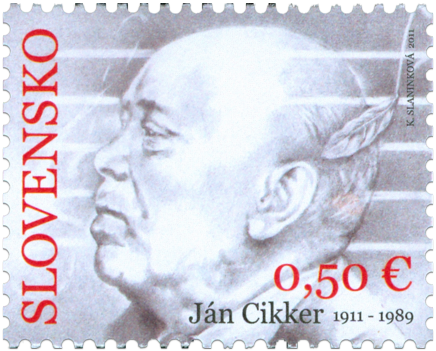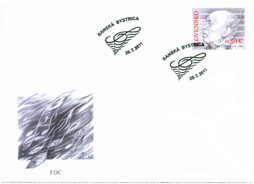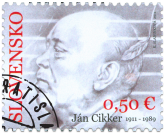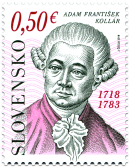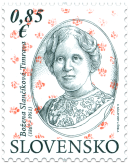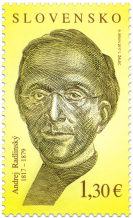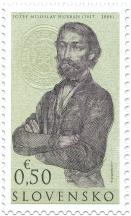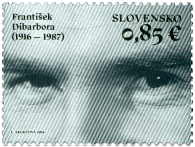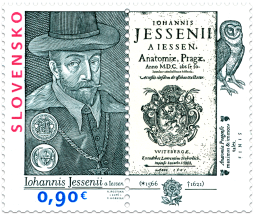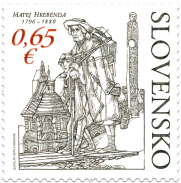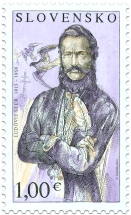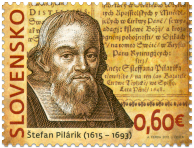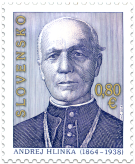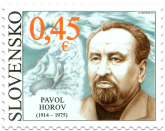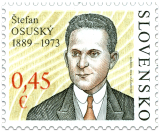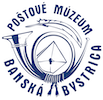502 Date of issue
29.07.2011 Face value
0.50 € Sell price
0.50 €
Music composer Ján Cikker (29th July 1911 Banská Bystrica – 21st Dec 1989 Bratislava) studied composing, conducting and organ playing at the Prague Conservatory from 1930 to 1936 and musicology at the Charles University at the same time, later (1936 – 1937) at the Music Academy in Vienna.
Thanks to a thorough training already his early compositions reflected the fact that the composer not only mastered the compositional level of then Prague’s environment, but showed they also had some of the typical characteristics of compositional masters of a mature manuscript – a broad melodic gesture, vaulted expressive surfaces, idyll, dance rhythmic, emotional strength, and to a lesser extent Slavic rhapsody. From 1938 to 1951 Cikker worked in Bratislava as a teacher of music theory and during the years 1945 to 1948 he also worked as an editor of the Opera of the Slovak National Theatre. Beginning in 1951 he taught composing at the Academy of Performing Arts which was established shortly before (1949). Its graduates have included several prominent Slovak composers such as I. Zeljenka, M. Bázlik and others.
Several of Cikker’s orchestral, chamber, vocal and choral compositions have become part of the repertoire of local orchestras, such as the Concertino for piano and orchestra (1942), Slovak Suite for large orchestra (1943), Symfonietta for Orchestra (1948), Dramatic Fantasy for Orchestra (1957 ), Sonatine for Piano (1933), String Quartet I and II (1935), Of Mommy (1940), Tatra’s streams (1954), What Children Told Me (1957).
Several times the composer confronted himself with adaptations of Slovak folk music: Stamp dance (1954), Recruit (1951), Meadow songs and dances for female choir and orchestra (1950). Socially and politically remarkable is Cikker’s Jingle for Free Slovak transmitter in Banská Bystrica in 1944. Ján Cikker’s works also enriched the area of opera significantly. Already by his choice of topics he was expressing a strong focus on the universal message of opera. Most often he was inspired by the artwork of the greatest authors of world’s literature (W. Shakespeare, Ch. Dickens, L.N.Tolstoy, R. Rolland, K. Čapek, H. von Kleist etc.).
The most important of Cikker’s opuses include the operas Juro Jánošík (Bratislava 1954), Beg Bajazid (Bratislava 1957), Resurrection (Praha 1962), Mr. Scrooge (Staatstheater Kassel 1963), Play of Love and Death (Nationaltheater Munich 1969) and Coriolanus (Prague 1974). Throughout his life Ján Cikker won several awards such as the Slovak National Prize (1945), Merited Artist (1961), National Artist (1966), Herder Prize (Vienna 1966), Madách Prize (Budapest 1966), UNESCO Prize for music (1977) etc.
Ján Cikker belongs to the most significant Slovak composers of the 20th century and foremost in Slovak musical modernism.
Tomáš Surý
Similar products
657 Date of issue
01.03.2018
641 Date of issue
02.10.2017
637 Date of issue
07.07.2017
631 Date of issue
17.03.2017
626 Date of issue
18.11.2016
613 Date of issue
22.06.2016
608 Date of issue
10.03.2016
597 Date of issue
23.10.2015
582 Date of issue
06.02.2015
570 Date of issue
26.09.2014
564 Date of issue
23.05.2014
560 Date of issue
31.03.2014
© 2024 POFIS - Postal philatelic service. All rights reserved

